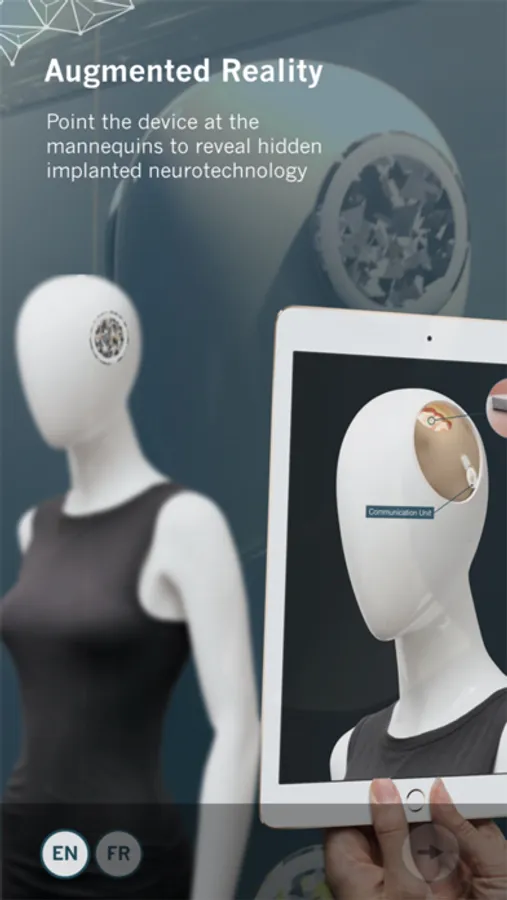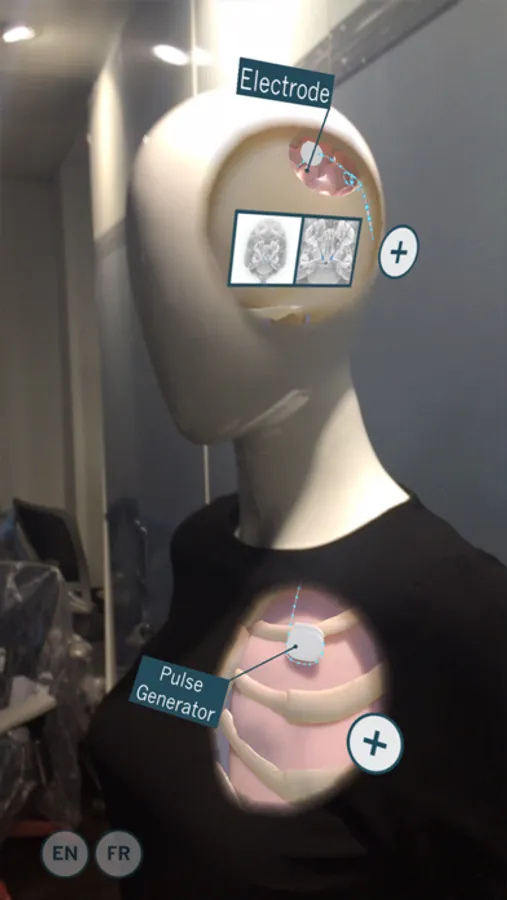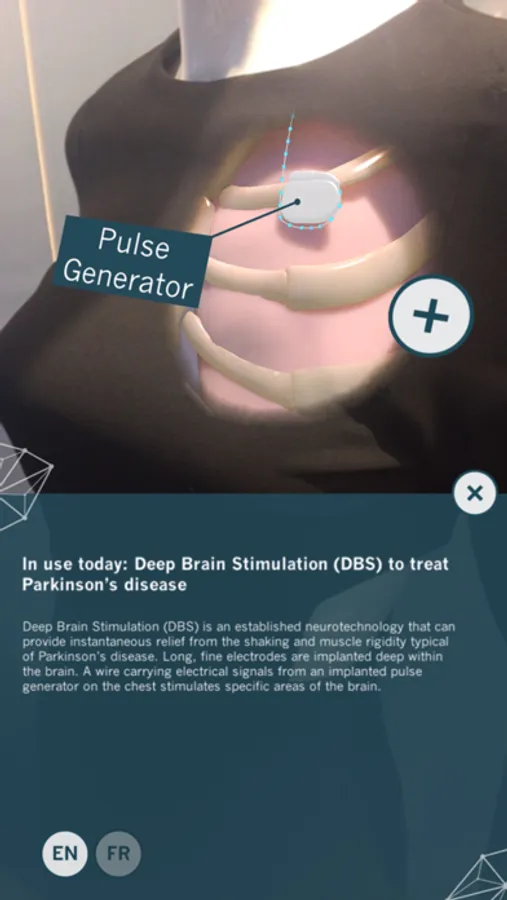About Be Bionic
Point the device at the 'Be Bionic' mannequins to reveal hidden implanted neurotechnology
You can investigate the following using the 'Be Bionic' app:
1. Future technology: Thought controlled nerve stimulation to reactivate arm muscles.
It may sound like science fiction, but the development of a brain computer interface (BCI) that can read the minds of people with paralysis in order to control a robotic arm, or even their own arm, is the focus of a major Wyss Center-led project. Use the ‘Be Bionic’ app to see the how the technology will work
2. Future technology: 'Be Bionic' app shows reactivation of paralyzed limbs with thought controlled spinal cord stimulation
The concept of a brain controlled device that directly stimulates the spinal cord could restore lower limb function for people with paralysis. The Wyss Center is working with EPFL researchers in this area. Use the ‘Be Bionic’ app to see the how the technology will work
3. In use today: Restoration of hearing with a cochlear implant
The cochlear implant, used to restore hearing, is the most common of all existing neurotechnologies. Use the ‘Be Bionic’ app to see the how the technology works
4. Future technology: Restoring vision with bionic implants
A new dawn in optical innovation is set to dramatically improve vision using miniaturized components that fit entirely behind the eye. The Wyss Center is working with EPFL to develop a bionic eye implant that will bypass damaged optical cells to restore vision. Use the ‘Be Bionic’ app to see the how the technology will work
5. In use today: Deep Brain Stimulation (DBS) to treat Parkinson’s disease
Deep Brain Stimulation (DBS) is an established neurotechnology that can provide instantaneous relief from the shaking and muscle rigidity typical of Parkinson’s disease. Use the ‘Be Bionic’ app to see the how the technology works
6. Future technology: Controlling tinnitus with neurofeedback
Wyss Center and EPFL researchers are working on an innovative future technology that would enable people to control the prevalent and debilitating condition of tinnitus through thought. Use the 'Be Bionic' app to see the how the technology will work
NOTE:
The 'Be Bionic' app only works when you have the correct markers available.
You can investigate the following using the 'Be Bionic' app:
1. Future technology: Thought controlled nerve stimulation to reactivate arm muscles.
It may sound like science fiction, but the development of a brain computer interface (BCI) that can read the minds of people with paralysis in order to control a robotic arm, or even their own arm, is the focus of a major Wyss Center-led project. Use the ‘Be Bionic’ app to see the how the technology will work
2. Future technology: 'Be Bionic' app shows reactivation of paralyzed limbs with thought controlled spinal cord stimulation
The concept of a brain controlled device that directly stimulates the spinal cord could restore lower limb function for people with paralysis. The Wyss Center is working with EPFL researchers in this area. Use the ‘Be Bionic’ app to see the how the technology will work
3. In use today: Restoration of hearing with a cochlear implant
The cochlear implant, used to restore hearing, is the most common of all existing neurotechnologies. Use the ‘Be Bionic’ app to see the how the technology works
4. Future technology: Restoring vision with bionic implants
A new dawn in optical innovation is set to dramatically improve vision using miniaturized components that fit entirely behind the eye. The Wyss Center is working with EPFL to develop a bionic eye implant that will bypass damaged optical cells to restore vision. Use the ‘Be Bionic’ app to see the how the technology will work
5. In use today: Deep Brain Stimulation (DBS) to treat Parkinson’s disease
Deep Brain Stimulation (DBS) is an established neurotechnology that can provide instantaneous relief from the shaking and muscle rigidity typical of Parkinson’s disease. Use the ‘Be Bionic’ app to see the how the technology works
6. Future technology: Controlling tinnitus with neurofeedback
Wyss Center and EPFL researchers are working on an innovative future technology that would enable people to control the prevalent and debilitating condition of tinnitus through thought. Use the 'Be Bionic' app to see the how the technology will work
NOTE:
The 'Be Bionic' app only works when you have the correct markers available.


